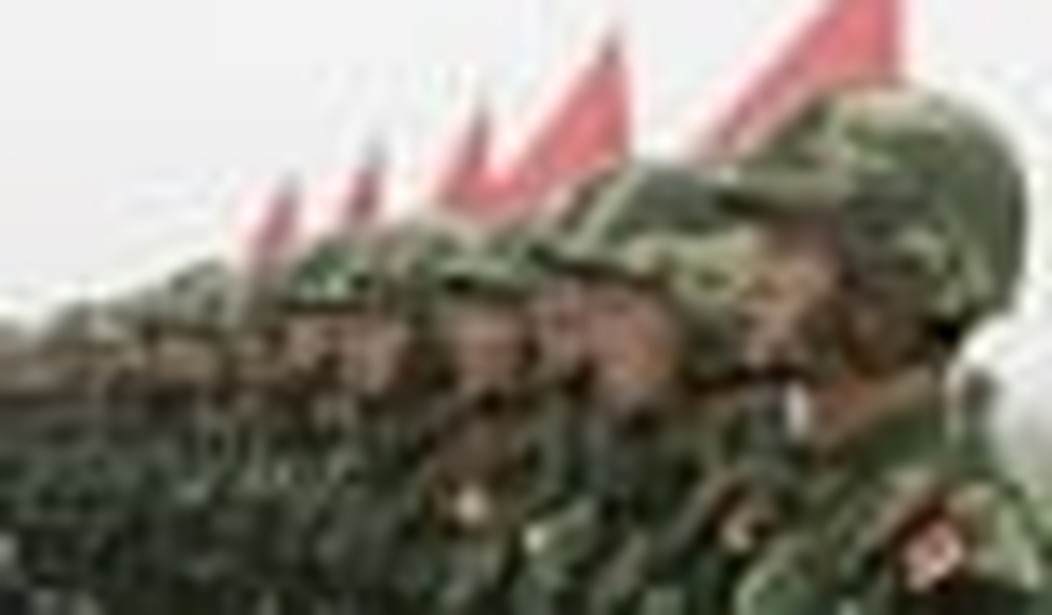“Every nation has a right to defend itself and to spend as it sees fit for that purpose, but a gap as wide as what seems to be forming between China’s stated intent and its military programs leaves me more than curious about the end result,” said Admiral Mike Mullen this Wednesday. “Indeed, I have moved from being curious to being genuinely concerned.”
It’s about time the chairman of the Joint Chiefs of Staff, in public, expressed disquiet about the Chinese military buildup. For decades, American flag officers, many of them from the Navy, have remained optimistic about America’s military relations with China. And after every Chinese hostile act — even those constituting direct attacks on the United States, such as the March 2009 attempt to interfere with the Impeccable in the South China Sea — American admirals have either remained silent or said they were “perplexed” or “befuddled” by Beijing’s intentions.
Why the befuddlement? The assumption in Washington has been that America was so powerful that we could integrate hardline Chinese leaders into a liberal international system they had no hand in creating. To this end, successive administrations sought, among other things, to foster ties between the American and Chinese militaries.
The Pentagon, therefore, pushed for port calls, reciprocal visits of officers, a hot line, and an incidents-at-sea agreement, with varying degrees of success. Admiral Timothy Keating even went so far as to offer to help China build aircraft carriers.
Keating’s offer, made in May 2007 when he was commander of U.S. forces in the Pacific, may have been extended with the knowledge the Chinese would reject it, but the apparent generosity was nonetheless in keeping with the general approach of the Navy during the Bush administration, an approach that President Obama has also adopted. So if there is any significance to Mullen’s recent comment, it is that the American military, at the highest levels, is beginning to voice in open forums its doubts about Beijing’s ultimate intentions. At this point, however, the expressions of “genuine concern” remain muted.
Senior Chinese officers, on the other hand, have no trouble telling us how they really feel.
In February, Colonel Meng Xianging promised a “hand-to-hand fight with the U.S.” sometime within the next 10 years “when we’re strong enough.” “We must make them hurt,” said Major-General Yang Yi this year, referring to the United States.
And last month, at the Strategic and Economic Dialogue in Beijing, a Chinese flag officer launched a three-minute rant that stunned the 65 or so American officials in the audience. Everything that is right with U.S. relations with China is due to China, said Rear Admiral Guan Youfei. Everything that is wrong is Washington’s fault. According to Guan, the United States sees China as an enemy.
A senior American official traveling on Secretary of State Clinton’s plane back to the United States said the admiral’s comments were “out of step” with the views of China’s civilian leaders. U.S. officials at the time also predicted that Beijing would soon welcome Robert Gates on his long-planned trip to China.
They were wrong. On June 3 the Chinese foreign ministry announced that the Defense secretary was in fact not welcome. Gates, who also thought he would travel to Beijing this month, said the turndown was just the military’s fault. “Nearly all of the aspects of the relationship between the United States and China are moving forward in a positive direction, with the sole exception of the military-to-military relationship,” he said on his way to Singapore. “The PLA is significantly less interested in developing this relationship than the political leadership of the country.”
Is that true? “Admiral Guan was representing what all of us think about the United States in our hearts,” a senior Chinese official told the Washington Post. “It may not have been politically correct, but it wasn’t an accident.” Chinese flag officers do not launch into polemical speeches at tightly scripted events, such as the once-a-year Strategic and Economic Dialogue, and it was reckless for American officials to assume, despite everything, that Admiral Guan was speaking only for himself.
Gates perhaps knows better now. After having his visit rejected at the last moment, he had to endure a series of hostile comments from Chinese flag officers at a security conference in Singapore at the beginning of this month. And that is just more evidence our officials and diplomats, even after more than three decades of close relations with their counterparts in Beijing, still do not understand China.
That, of course, is another “genuine concern.” So what, exactly, is the consequence of our miscomprehending the Chinese, refusing to hear what they openly say? It’s worse than the rejection of official visits to Beijing by overly eager Defense secretaries. Listen to former State Department analyst Robert Sutter: “China is the only large power in the world preparing to shoot Americans.”









Join the conversation as a VIP Member